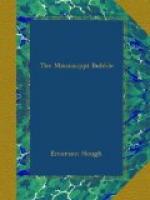“Yes; let us in,” cried Will Law, with sudden energy. “’Tis time that we took steps to set my brother free.”
“True, so say they all, young master,” replied the turnkey, grinning. “’Tis easy to get ye in, but passing hard to get ye out again. Yet, since the young man ye wish to see is a very decent gentleman, and knoweth well the needs of a poor working body like myself, we will take the matter under advisement, as the court saith, forsooth.”
They passed through the heavy gates, down a narrow and heavy-aired passage, and finally into a naked room. It was here, in such somber surroundings, that Mary Connynge saw again the man whose image had been graven on her heart ever since that morn at Sadler’s Wells. How her heart coveted him, how her blood leaped for him—these things the Mary Connynges of the world can tell, they who own the primeval heart of womankind.
When John Law himself at length entered the room, he stepped forward at first confidently, eagerly, though with surprise upon his face. Then, with a sudden hesitation, he looked sharply at the figure which he saw awaiting him in the dingy room. His breath came sharp, and ended in a sigh. For a half moment his face flushed, his brow showed question and annoyance. Yet rapidly, after his fashion, he mastered himself.
“Will,” said he, calmly, to his brother, “kindly ask the coachman to wait for this lady.”
He stood for a moment gazing after the form of his brother as it disappeared in the outer shadows. For this half-moment he took swift counsel of himself. It was a face calm and noncommittal that he turned toward the girl who sat now in the darkest corner of the room, her head cast down, her foot beating a signal of perturbation upon the floor. From the corner of her eye Mary Connynge saw him, a tall and manly man, superbly clad, faultless in physique and raiment from top to toe. He stood as though ready to step into his carriage for some voyage to rout or ball. Youth, vigor, self-reliance, confidence, this was the whole message of the splendid figure. The blood of Mary Connynge, this survival, this half-savage woman, unregulated, unsubdued, leaped high within her bosom, fled to her face, gave color to her cheek and brightness to her eye. Her breath shortened after feline fashion. Deep was calling unto deep, ancient unto ancient, primitive unto primitive. Without the gate of London prison there was one abject prisoner. Within its gates there were two prisoners, and one of them was slave for life!
“Madam,” said John Law, in deep and vibrant tone, “you will pardon me if I say that it gives me surprise to see you here.”
“Yes; I have come,” said the girl, not logically.
“You bring, perhaps, some message?”
“I—I brought a message.”
“It is from the Lady Catharine?”




